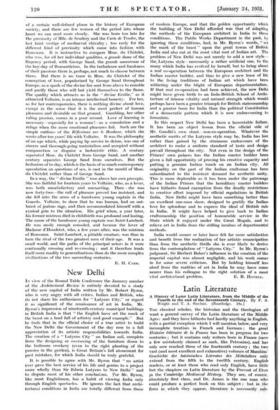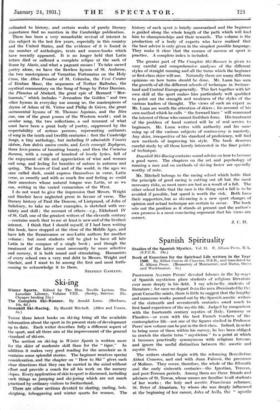Latin Literature
A History of Later Latin Literature, from the Middle of the Fourth to the end of the Seventeenth Century. By F. A. Wright and T. A. Sinclair. (Routledgo. 18s.) Tun classical scholar, the historian and the theologian all want a general survey of the Latin literature of the Middle Ages: and they have hitherto had hardly anything in English, with a partial exception which I will mention below, and very incomplete treatises in French and German : the great Histoire litteraire de la France has been in progress for two centuries ; but it contains only writers born in France (save a few mistakenly claimed as such, like Petronius), and has only now reached those of the fourteenth century ; the .two vast (and, most excellent and exhaustive) volumes of Manitius' Geschichte der, lateinischen Literatur des Mittelalters only extend from the fifth to the twelfth century. English readers, or at least those who read only English, have little but the chapters on Latin literature by the Provost of Eton in the Ccanbridge Mediaeval History. They are, of, course, absolutely first class, and Dr. James is the one man who could produce a perfect book on this subject : but in the form in which they appear, literature is necessarily sub-
ordinated to history, and certain works of purely literary importance find no mention in the Cambridge publication.
There has been a very remarkable revival of interest in this subject in the last few years, especially in this country and the United States, and the evidence of it is found in the number of anthologies, texts and source-books which have recently appeared. It is no longer held that Latin letters died or suffered a complete eclipse at the sack of Rome by Alaric, and what a pageant ensues ! To take sacred poetry alone, we have the flawless hymns of St. Ambrose, the two masterpieces of Verantius Fortunatus on the Holy Cross, the Altus Prosator of St. Columba, the Veni Creator of Hraban Maur, the sequences of Notker Balbulus, the mystical commentary on the Song of Songs by Peter Damian, the Planctus of Abelard, the great epic of Bernard " Mor- lanensis," which includes " Jerusalem the Golden " and two other hymns in everyday use among us, the masterpieces of rhyme of Adam of St. Victor and Philip de Greve, the great sacramental hymns of St. Thomas Aquinas, and the Dies irae, one of the great poems of the Western world ; and in secular song, the two collections, a sad remnant of what must have been a great body of poetry, suppressed by the respectability of serious persons, representing outbursts of song in the tenth and twelfth centuries : first the Cambridge Songs, a tiny anthology, but including 0 admirabile Veneris idolum, lam dulcis amica venito, and Levis exsurgit Zephyrus, three love-poems of haunting beauty, and then the Carmina Burana, with a couple of hundred of lovely lyrics, full of the enjoyment of life and appreciation of wine and woman and song, and feeling for beauties of nature in autumn and spring. The lovers of God and of the world, in the ages we once called dark, could express themselves in verse, Latin verse, as sweetly and with as much fire and feeling as could their ancestors whose natural tongue was Latin, or as we can, writing in the varied vernaculars of the West.
I do not want to give the impression that Messrs. Wright and Sinclair have neglected prose in favour of verse. The literary history of Paul the Deacon, of Liutprand, of John of Salisbury, to take no other examples, is sketched with cer- tainty and skill ; the account of others—e.g., Ekkehard IV of St. Gall, one of the greatest writers of the eleventh century —contains much that to me at least is new and of the liveliest interest. I think that I should myself, if I had been writing this book, have stopped at the close of the Middle Ages, and have left the Renaissance or neo-Latin authors for another volume : but most students will be glad to have all late Latin in the compass of a single book ; and though the treatment of the latter must necessarily be more selective and cursory, it is both sound and stimulating. Humanists of every school owe a very real debt to Messrs. Wright and Sinclair, and I want to be among the first and most forth-
coming to acknowledge it to them. STEPHEN GASELEE.







































 Previous page
Previous page